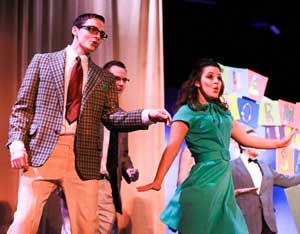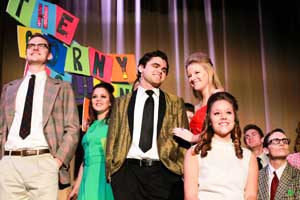Story by Da’Sha Tuck, Staff writer

Heith Chandler and Alexandria Routen dance and sing.
About halfway through last weekend’s Campus Lights production of “Hairspray,” the actors formed a mob-like huddle on stage as the main character, Tracy Turnblad, tried to work her way onto a dance show.
In this scene, the producers of the fictitious 1960s dance program wouldn’t let the black friends of “Hairspray’s” heroine participate. An outraged Turnblad and her fellow protesters not only yelled but carried signs calling for equality and fairness. Then the actress playing Turnblad revealed her sign, which carried a present-day message: “Black Lives Matter.”
“‘Hairspray’ was a great choice for this year,” said Catherine Triplett, freshman from Owensboro, Kentucky, who was in the audience Saturday to watch her first Campus Lights production. “It shows the progress that has been made in terms of racial discrimination, but also called attention to the fact that discrimination does still happen and the fight is not over.”

Kevin Brost dances on the Corny Collins during Sunday’s performance, which began at 2:30 p.m.
The production sold out Saturday and Sunday. Friday’s showing was canceled due to inclement weather. This year was the 79th production of Campus Lights, which is produced by Murray State’s Phi Mu Alpha fraternity and Sigma Alpha Iota sorority. Both are affiliated with the Murray State music program.
Proceeds from the musical go toward future productions as well as scholarships for future music majors.
With Murray State celebrating 60 years of desegregation, the Campus Lights Board of Producers said they tried to make a timely choice with “Hairspray.”
“It is our pleasure to present this show during the 60th anniversary of desegregation at Murray State University,” said Alan Saltzman, Board of Producers chairman.
“The turnout was better than we could have imagined,” said Emma Whitt, sophomore from Knoxville, Tennessee, who played the gym teacher and the matron. “Even with the inclement weather, hordes of people made the effort to come and support Campus Lights and we are so thankful.”
“Hairspray” is a production set in Baltimore in 1962. Turnblad, the lead character, is overweight, which makes her a target for bullying. But Turnblad is defiant.
She decides she wants to integrate the popular TV dance show in which black people are only allowed to dance one day a month. And that does not sit well with Turnblad.

Madison Jarrett, Alexandria Routen, Collin Andersson, Kelsey McIlroy, Karen Trevarthen and Heith Chandler pose together during “Hairspray,” which was this year’s Campus Lights performance.
“If I were president, I’d make every day Negro Day,” said Turnblad, played by Emily Duff, senior history education major.
The audience, filled with alumni and student organizations, erupted in cheers after that line.
Whitt said Hairspray: the Broadway Musical, contained such positivity and a message of acceptance.
“It was a wonderful way to celebrate how far we as a society have come,” Whitt said.
The production – which requires a diverse cast who can sing, dance and act – came together in only three weeks.
“The entire cast, directors and all affiliated with the musical put a monumental amount of work into the three-week process that is Campus Lights,” said Zach Ryne, senior from Bowling Green, Kentucky, who played one of the dancers, Sketch, and a guard.
For the actors, participating in this year’s Campus Lights was not only an honor because of the nearly eight decades of tradition, but many said they were particularly proud of the themes that showed through in “Hairspray,” such as the importance of change and acceptance.
“All too often, people are much too quick to judge, and there is hostility without purpose,” Ryne said. “As long as we can be accepting of others and ourselves, then we can actually become the nicest kids in town.”